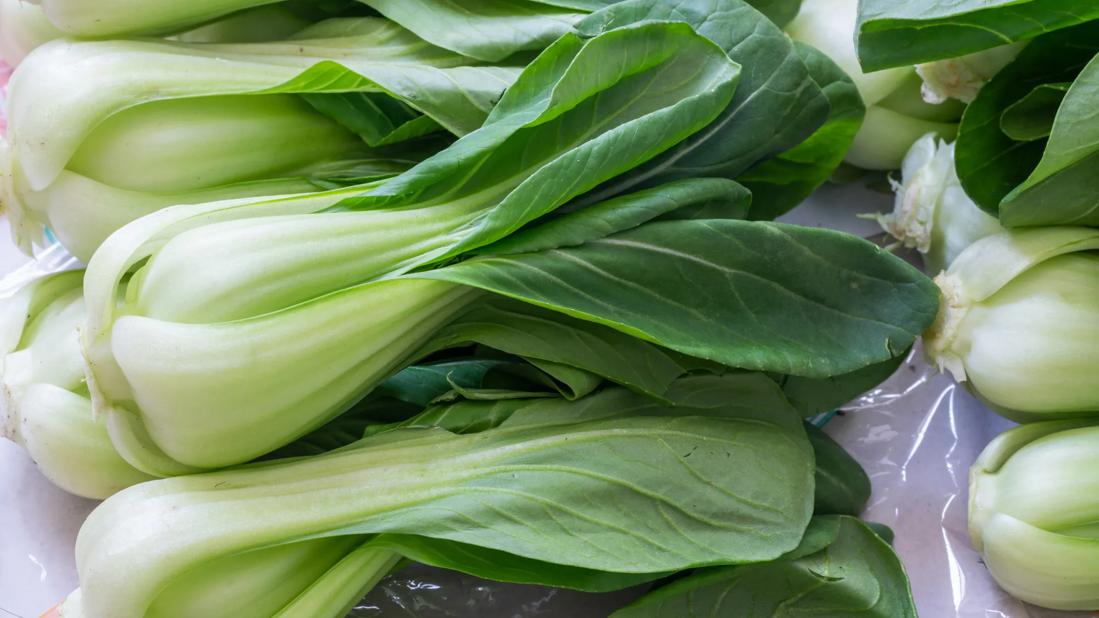This cruciferous veggie boosts your bone, eye and heart health and contributes to a lower risk of cancer

Image content: This image is available to view online.
View image online (https://assets.clevelandclinic.org/transform/7f542929-325b-4fa5-97ae-6ddd6784ae5b/bok-choy-1467548021)
Rows of fresh bok choy
Cruciferous vegetables, like broccoli, Brussels sprouts, cabbage and cauliflower, are exceptionally healthy. But not everyone loves them — and some people can’t easily digest them. If you’ve been skipping these foods in the produce section, bok choy may be your new best cruciferous friend.
Advertisement
Cleveland Clinic is a non-profit academic medical center. Advertising on our site helps support our mission. We do not endorse non-Cleveland Clinic products or services. Policy
“Bok choy is also known as Chinese cabbage, but it looks more like a bunch of leafy greens than a round head of cabbage,” says registered dietitian Julia Zumpano, RD, LD. “It’s much milder in flavor and easier to digest than its cruciferous cousins in the Brassica family.”
Zumpano explains why bok choy is good for you and how to eat more of it.
Like all cruciferous veggies, bok choy (aka pak-choi) is packed with healthy goodness. It provides many important nutrients with few calories and no fat or cholesterol.
One cup of raw bok choy contains:
That same cup also provides several essential vitamins, including:
“That means that a serving of bok choy provides more than one-third of your recommended daily value of vitamin C,” Zumpano points out.
If bok choy isn’t yet a standard item on your grocery list, it deserves a try — due, in part, to the fact that it contains a wealth of disease-fighting antioxidants and minerals.
Zumpano shares potential bok choy health benefits.
Bok choy is loaded with the antioxidants your body needs to protect your cells from damage.
Advertisement
Here’s how it works: Your body naturally produces free radicals, unstable molecules that can run rampant and cause oxidative stress — a process that damages cells. This damage can eventually lead to chronic conditions like cancer, cardiovascular disease and more.
Antioxidants are nutrients that counteract free radicals, neutralizing them so they can’t cause damage. Bok choy provides cell-protecting antioxidants like:
Your bones may seem rigid and unchanging, but they’re actually living tissue — and they need the vitamins and minerals found in veggies like bok choy to stay strong.
Maintaining healthy bones requires several minerals and other nutrients, which also help prevent osteopenia (bone density loss) and osteoporosis(brittle bones).
“Your body is constantly building up new bone tissue and breaking down old, damaged tissue, Zumpano explains. “So, you need a continuous supply of bone-building nutrients like calcium.”
Bok choy contains several nutrients that contribute to bone health:
“When you’re trying to get more calcium, you’re more likely to think about dairy foods than veggies,” Zumpano acknowledges. “But cruciferous and green leafy vegetables are actually great sources of calcium. And they’re in a form your body can easily absorb and use.”
Bok choy is an excellent source of beta-carotene and vitamin A, two important nutrients for protecting your eye health. Your body converts beta-carotene into vitamin A, so eating foods that contain both gives you a double boost!
These two powerful antioxidants help prevent:
Bok choy contains calcium and potassium, which both benefit your blood pressure. Plus, its antioxidants protect your entire cardiovascular system from free radical damage.
“The right balance of key minerals helps keep blood pressure in a healthy range,” Zumpano says. “Too much sodium can lead to high blood pressure, but calcium and potassium keep the damaging effects of sodium in check.”
Why does that matter? Because chronic high blood pressure (hypertension) stresses your heart and damages your arteries, which increases your risk of:
“All cruciferous veggies, including bok choy, contain molecules that appear to help your body ward off cancer,” Zumpano says.
Research shows that including these vegetables in your diet once a week is associated with a lower risk of several types of cancer, including cancer of the mouth, esophagus, colorectum and breast.
Advertisement
“Bok choy’s green leaves and white stems are edible, and you can eat them either raw or cooked,” Zumpano shares. “If raw cruciferous vegetables tend to give you gas or other tummy troubles, you may want to stick with cooked bok choy.”
Not sure what to do with this super-veggie? Bok choy is tasty sautéed, steamed or grilled. You can chop it, slice it into strips or cook the leaves and stems whole. Try it on its own as a seasoned side or in a variety of dishes, like curries, vegetable medleys and even smoothies.
“Bok choy typically has a mild flavor,” Zumpano reiterates. “But if it’s too bitter for your tastes, try steaming it for a few minutes to mellow it out a bit.”
Advertisement

Sign up for our Health Essentials emails for expert guidance on nutrition, fitness, sleep, skin care and more.
Learn more about our editorial process.
Advertisement
The tropical fruit is a good source of antioxidants and vitamin C
High amounts of cholesterol and saturated fat in red meat may be linked to heart disease
The leaves and pods from this tree are rich in essential nutrients
This starchy root vegetable is a staple in many global cuisines — but it has to be prepared correctly, or it can cause serious concerns
These delicate green sprouts can give you an extra dose of vitamin K and other nutrients — but they’re not safe for everyone
Edamame, lentils and chicken breast are good sources of protein
Eating this root vegetable can help support your eye, heart and brain health
The flavorful herb is full of antioxidants that may help regulate blood sugar
Although it could be used as a moisturizer, this new trend is not recommended
Communicating clear limits helps protect your time, energy and emotional well-being
High cholesterol can be genetic, but testing and treatment can lower your heart disease risk